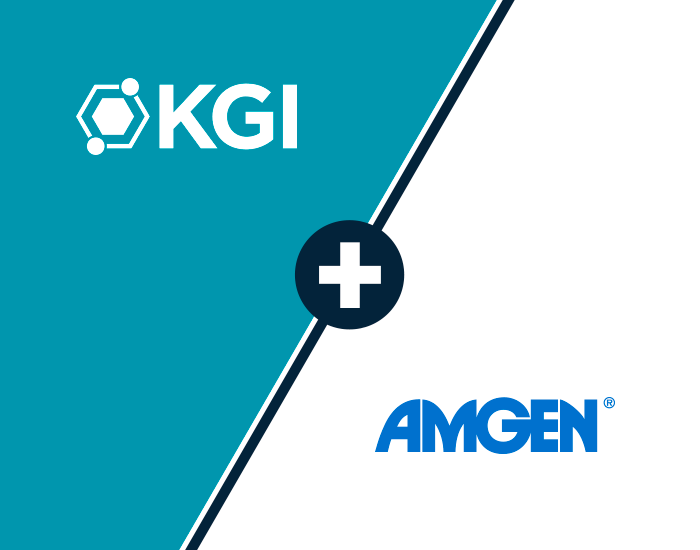The life sciences technology industry is undergoing a sea change as advances in genomics technology are rapidly moving from the research lab into clinical settings and drug development. Genome sequencing over the past few years has led to a greater understanding of how differences in our genome can lead to human disease, prompting the development of new technologies in both diagnosis and treatment.
In December 2019, biotechnology company Amgen supplied Keck Graduate Institute (KGI) with a $1 million grant to establish a Center for Training in Applied Genomics. A vital component of this grant was to create an educational model for training the existing workforce at companies such as Amgen in the skills and the knowledge they need to capitalize on these advances.
KGI's new Certificate in Applied Genomics will do just that: teach working professionals to:
- Describe current methods and challenges for interpreting DNA and RNA sequencing
- Use genome editing as a therapy
- Demonstrate knowledge of existing bioinformatics programs
- Manipulate genome-wide datasets to conclude relevant to clinical needs
- And more
The seven-week, online pilot course, "Translating Concepts to Clinic," started April 19 and runs through May 30.
The introductory course surveys the recent developments in human genomics, from advances in DNA and RNA sequencing technology and clinical diagnostics to genetic engineering and gene therapies. The course discusses the science behind the headlines and dives into the data analysis challenges and ethical considerations that the rapidly changing field poses.
Participants will explore what is happening in clinical and applied genomics today and discuss emerging technologies and treatments on the horizon. This first pilot class consists of 24 Amgen employees. Subsequent offerings of this course will be open to industry professionals from any number of companies.
"As the life sciences move more towards gene and cell therapy and precision medicine, an understanding of genomics is going to be necessary for anyone who has a position within the life sciences and biotechnology industry," said Beth Walkenbach, KGI assistant director of corporate partnerships. "For anyone who's been out of school for the last 10 years, this is new information. Thus, these courses are aimed at providing established professionals in the life sciences industry with a basic knowledge of genomics so that they can be conversant on the cutting edge of biotechnology."
Other courses offered in KGI's Certificate in Applied Genomics—a 15-unit program that could take one to two years depending on whether students are enrolled full or part-time—are:
- Human Variation and Disease
- Clinical Genetics: Actionability and Genome Editing
- DNA & RNA Sequencing
- Epigenomics
The program culminates in an Applied Genomics Capstone, a self-directed project intended to give students a chance to apply their newfound skills to a project or a problem they've had at their job, thus giving value back to their company.
The certificate is part of KGI's executive education initiative to get working professionals up to speed in the latest biotechnology developments.
KGI MSGDA Program Director Dr. Barbara Fortini is the subject matter expert and key faculty for the Certificate in Applied Genomics program. Her goal in selecting relevant course material was to fill in the gaps for life sciences employees who want to learn more about the latest developments in genomics without necessarily getting a PhD.
"If you hadn't been in grad school in the past five years, these things weren't invented yet," Fortini said. "You might have a chance to read or talk to someone about them, but there's something different about a classroom environment. Our faculty members guide and curate the key things you need to know and give that targeted delivery of information to make sure you understand the most important aspects of the genomics field."
When choosing topics, Fortini thought about what courses she would like to take if allowed to go back to school, and she sought feedback from other industry professionals. KGI Instructional Designer Dr. Kevin Glover has also been working closely with KGI faculty to develop courses for industry.
"We researched to figure out how we could put together a series of courses, lectures, and activities that would be worth people's time and also be extremely interesting," Fortini said.
"For our corporate education initiatives, we find it's important to have a close relationship between our Corporate Partnerships team at KGI and the faculty and the instructional designers," Walkenbach said. "We need to be able to come together and communicate so that we can effectively design curriculums that speak to people in industry."
"Translating Concepts to Clinic" is being taught by Curtis Jamison, a KGI adjunct professor with years of biotech industry experience. Jamison is currently Head of Engineering for Sequencing.com and previously spent seven years as Senior Manager for Illumina Inc.
"I'm very excited to be part of helping develop the 'Applied Genomics: Translating Concepts to Clinic' course," Jamison said. "Enabling busy professionals to expand their knowledge and position themselves for advancement is very satisfying, and I always end up learning from their experiences as well."
